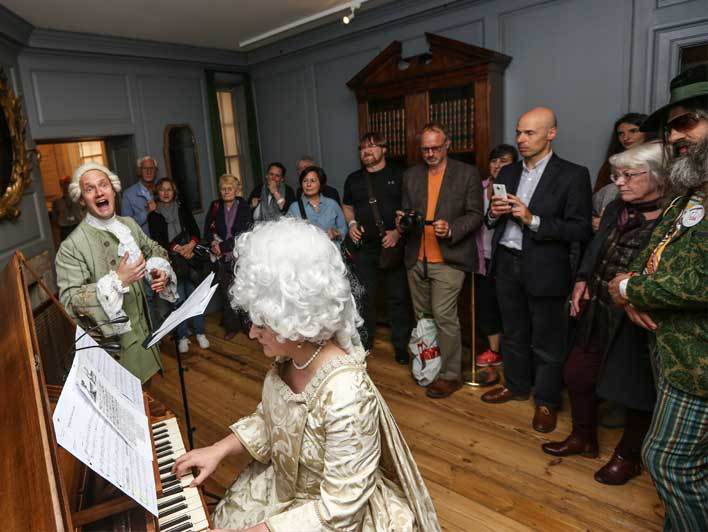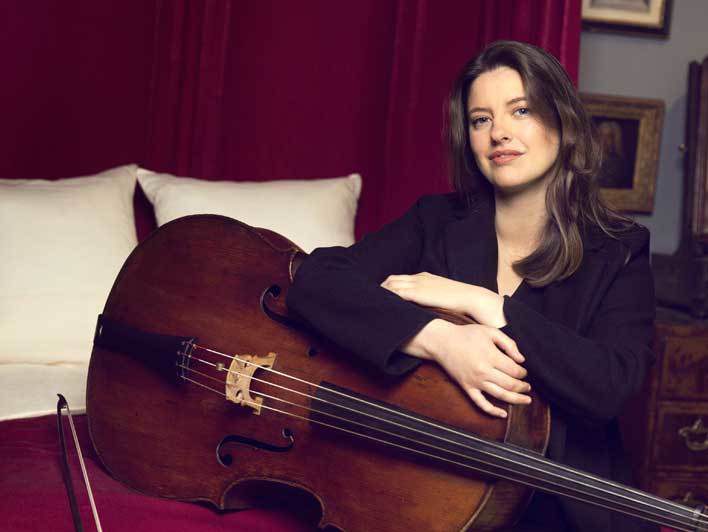SCIPIONE (HWV 20)
Libretto: Paolo Antonio Rolli, after Antonio Salvi
First performance: 12th March 1726, King's Theatre, London
Cast
- Antonio Baldi (Alto castrato)
- Francesco Bernardi, called "Senesino" (Alto castrato)
- Francesca Cuzzoni (Soprano)
- Luigi Antinori (Tenor)
- Giuseppe Maria Boschi (Bass)
- Livia Costantini, called "La Polacchina" (Soprano)

Synopsis
Act I
Scipio arrives in Carthage in triumph, having won the city in battle. He recognises the faithful service of his captain Lelio, who in turn offers Scipio the two fairest captives – Berenice and Armira. Scipio is immediately struck by Berenice’s beauty, but she begs him to defend her honour, which he promises to do. Scipio passes Armira into Lelio’s care. Berenice sighs for her lost betrothed Lucejo, a name instantly recognised, and respected, by Lelio. Previously Lelio had been a prisoner of Lucejo’s father, the Celtiberian King, who had been granted him freedom. Lelio promises the women that they will be well cared for in the palace, but Berenice is not comforted.
Lucejo, disguised as a Roman soldier, steps from the crowd. He has observed Scipio’s interest in Berenice and is afraid of losing her to the conqueror. He resolves to follow her into the palace to rescue her.
In a garden of the palace Scipio and Lelio discuss their love for Berenice and Armira. Scipio leaves the women in Lelio’s care, and Lelio tries to comfort Armira by declaring his love for her. But Armira demands her freedom before she can love him in return.
Berenice now enters the garden, and Lelio congratulates her on winning Scipio’s heart. As proof of his love, Lelio tells her, Scipio has threatened death to anyone else who enters the garden. But Berenice’s thoughts are only for her lost love, Lucejo, who she was due to marry on the very day Carthage fell. Left alone she laments her lost love. To her surprise, Lucejo’s voice replies. She is terrified that he will be discovered, and begs him to flee and return with a conquering army to save her. Lucejo is alarmed by her demands, and suspects there is more to them. Berenice sees Scipio approaching and Lucejo hides.
Scipio begins to court Berenice, but Lucejo cannot bear to stand by and watch. He steps out from his hiding place and confronts Scipio who, despite Lucejo’s disguise detects his Iberian accent. Lucejo is about to reveal his identity but Berenice interrupts him and denies knowing him. Lelio appears and, recognising Lucejo immediately, concocts a story to save him. Pretending Lucejo is an insane Roman soldier called Erennius, he demands he leave immediately. Realising he has given way to his anger, and has been saved by Berenice and Lelio, Lucejo remains quiet. Scipio recommends Lelio care for the unfortunate Erennius. Left alone, Lucejo worries that Berenice’s denials might have been more than pretence. He struggles with the passions of jealousy and doubt within his own heart.

Act II
Ernando, King of the Balearic Islands and Berenice’s father, arrives to ransom her. He is met by Lucejo, who welcomes him in Scipio’s name.
In the palace Berenice reveals her identity as the daughter of King Ernando to Scipio. In turn he declares his love for her, but she tells him she is betrothed to Prince Lucejo of Celtiberia and can love no other. Scipio is in despair and leaves her. Lelio now enters with Lucejo. Berenice, frightened for her lover’s safety, demands that he leave immediately. Lucejo’s fears are confirmed and he scorns Berenice, threatening to kill himself in a jealous rage. Berenice asks Lelio to follow him and protect him from himself. Alone again, she bemoans her fate.
Lelio once more importunes Armira, but again she rejects his advances until he sets her free. Alone, she confesses that she will continue to encourage, though thwart, Lelio’s affection to play for time until her plight can become known to her father Indibile. Lucejo returns in search of Berenice. Armira tells him that Berenice is loved by Scipio, and Lucejo re-asserts his love for her. Armira promises her silence and offers her hand as proof, which Lucejo takes. Berenice has overheard the end of this conversation and misconstrues the situation. She confronts Armira and charges her with inconstancy, and the offended Armira leaves. Jealous herself now, Berenice tells Lucejo to leave her once again.
But Scipio now enters and Lucejo reveals his true identity. He challenges Scipio as a rival lover rather than a conquering general, but Lelio enters with soldiers and arrests Lucejo. Scipio promises Berenice that Lucejo’s life will be spared, but that she must resign herself to marry a Roman more worthy of her. She refuses, and once more declares her devotion to Lucejo.

Act III
Ernando is granted an audience with Scipio, who tells him that he has fallen in love with his daughter Berenice. He asks Ernando for his permission to marry her. But Ernando too is steadfast in his support of Lucejo, whose marriage to Berenice he has pledged, and refuses Scipio’s request. He tells Scipio that his honour is his most important possesion and he cannot give it up. Scipio struggles with his desire for Berenice, who his power can easily command, but instead he choses the path of virtue to protect his reputation.
Lelio tells Lucejo that he is to be taken to Rome as a prisoner. Lucejo begs for death rather than banishment, and Berenice begs to be sent to Rome with him. Scipio overhears her plea and promises her happiness.
In the throne room, Ernando presents Scipio with the ransom for his daughter, and the conqueror duly returns her to her father. But Scipio notices that Berence is still not entirely happy, and encourages her to be hopeful.
Elsewhere in the palace, Lelio has discovered that Armira is the daughter of Indibile, a friend to the Romans, and releases her. She finally admits her love for him.
Berenice has been summoned by Scipio, and on her way back to the throne room she meets Lucejo. He has been released by Lelio, given back his sword, and also summoned to Scipio’s presence. The two proclaim their undying love for each other, and Lucejo overcomes his jealousy.
All our assembled in the throne room. Scipio hands Berenice to Lucejo, and asks only for his friendship and support of Rome in return. Next, Scipio passes the ransom paid by Ernando to Berenice as her dowry. All rejoice in Scipio’s clemency, and praise the selfless conqueror.
Context
In the Autumn of 1725 the London newspapers were full of gossip about the impending arrival of a new Italian soprano. ‘We hear that the Royal Academy (of) Musick, in the Hay Market, have contracted with famous Chauntess for 2500 l. who is coming over from Italy against the Winter’, announced the Daily Journal on 31st August. A few days later, the London Journal gave more details: ‘Signiora Faustina, a famous Italian Lady, is coming over this Winter to rival Signiora Cuzzoni’. The Academy had, indeed, managed to hire the most famous soprano in Europe – the beautiful Faustina Bordoni. But she was in no hurry to rush to London, and eventually did not arrive until early in 1726.
Handel had already started work on Alessandro, to a libretto that carefully balanced the two female roles giving equal numbers of arias and duets, and a trio with the castrato, for his two leading ladies. But when Faustina delayed her arrival he had to urgently find an alternative libretto to set for the existing company. His regular collaborator Nicola Haym was not available, and so he turned instead to Paolo Antonio Rolli, an accomplished Italian poet and librettist who had been living in London since 1715. Rolli recorded that Handel composed the full score for Scipione in just three weeks, and the dating of the autograph score shows that it was completed on 2nd March 1726, just ten days before the first performance. To complicate matters further the contralto Anna Vincenza Dotti, who was to have played the role of Rosalba, Berenice’s mother, dropped out at the last moment and the character was cut. Rolli and Handel had to make some urgent adjustments to both the libretto and the score. Given this hasty creation, it is perhaps no surprise thatScipione is not the best of Handel’s compositions for the Royal Academy of Music.
Despite this, in 1733 Antoine François Prévost (author of the novel Manon Lescaut) was able to report from London that ‘Competent musicians have informed me that Julius Caesar, Scipione, and Rodelinda are (Handel’s) best works.’


